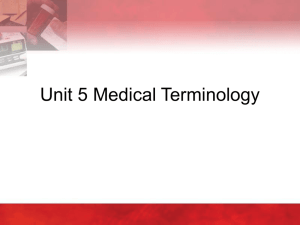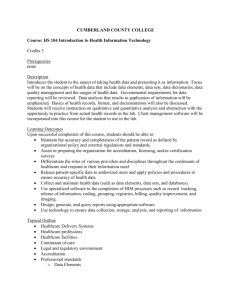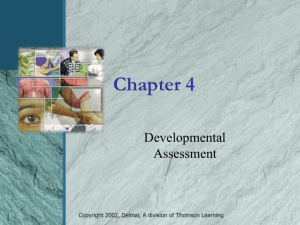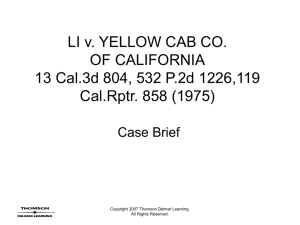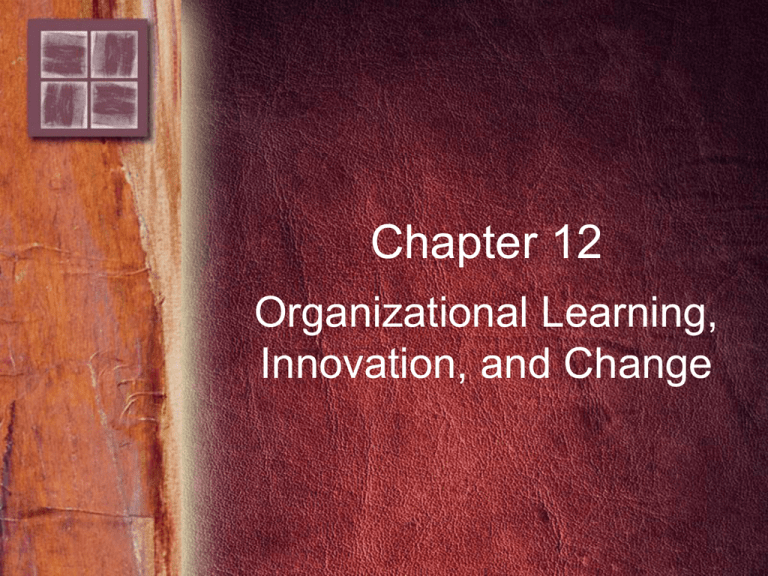
Chapter 12
Organizational Learning,
Innovation, and Change
Purpose and Overview
• Purpose
– To understand innovation and change as
complex and nonlinear sequences of events
Copyright © 2006 by Thomson Delmar Learning. ALL RIGHTS RESERVED.
2
Purpose and Overview
• Overview
– Change in an Unpredictable, Unknowable
World
– Health Care Organizations as Complex
Adaptive Systems
– Organizational Learning
Copyright © 2006 by Thomson Delmar Learning. ALL RIGHTS RESERVED.
3
Purpose and Overview
• Overview
– Limits of Organizational Learning
– Managing Organizational Innovation
– Implementing Large-Scale Organizational
Change
Copyright © 2006 by Thomson Delmar Learning. ALL RIGHTS RESERVED.
4
Change in an Unpredictable,
Unknowable World
• Quantum Theory
– World is unpredictable and unknowable
– Change, activity, and interconnectedness add
unpredictability
Copyright © 2006 by Thomson Delmar Learning. ALL RIGHTS RESERVED.
5
Change in an Unpredictable,
Unknowable World
• Chaos Theory
– Future state of world is unknowable
– Small differences in conditions can lead to
different outcomes
Copyright © 2006 by Thomson Delmar Learning. ALL RIGHTS RESERVED.
6
Change in an Unpredictable,
Unknowable World
• Quantum Theory & Chaos Theory
– Changing the way we think about
organizations and roles of leadership and
management
Copyright © 2006 by Thomson Delmar Learning. ALL RIGHTS RESERVED.
7
Health Care Organizations as
Complex Adaptive Systems
• Complex Adaptive Systems
– Individual agents have freedom to act
unpredictable ways
– Actions are interconnected and can change
context for others
Copyright © 2006 by Thomson Delmar Learning. ALL RIGHTS RESERVED.
8
Health Care Organizations as
Complex Adaptive Systems
• Two Forms of Complexity
– Combinatorial
• Number of constituent elements
• Number of interrelationships
– Dynamic-Feedback Loops
• Reinforcing
• Balancing
Copyright © 2006 by Thomson Delmar Learning. ALL RIGHTS RESERVED.
9
Organizational Learning
• Learning is a feedback process
• Organizational learning embraces both
adaptive and generative learning
Copyright © 2006 by Thomson Delmar Learning. ALL RIGHTS RESERVED.
10
Organizational Learning
• Single-Loop Learning
– Look for solutions within organization’s
policies, plans, values, and rules
– Error-and-correction process
– Promotes adaptive learning
Copyright © 2006 by Thomson Delmar Learning. ALL RIGHTS RESERVED.
11
Organizational Learning
• Double-Loop Learning
– Closes gap between desired and actual states
of affairs by questioning
– Modifies organization’s policies, plans, values,
and rules to guide action
– Promotes generative learning
Copyright © 2006 by Thomson Delmar Learning. ALL RIGHTS RESERVED.
12
Organizational Learning
Copyright © 2006 by Thomson Delmar Learning. ALL RIGHTS RESERVED.
13
Organizational Learning
• Learning Organizations
– Continual expansion to create desired results
– New patterns of thinking are nurtured
– Collective aspiration is set free
– People learn to learn together
– New knowledge and capabilities remain even
if individuals leave
Copyright © 2006 by Thomson Delmar Learning. ALL RIGHTS RESERVED.
14
Organizational Learning
• Learning Disciplines
– Five disciplines
– Combine to “expand its capacity to create its
future”
Copyright © 2006 by Thomson Delmar Learning. ALL RIGHTS RESERVED.
15
Organizational Learning
• Learning Disciplines
– Systems Thinking
– Personal Mastery
– Mental Models
– Shared Vision
– Team Learning
Copyright © 2006 by Thomson Delmar Learning. ALL RIGHTS RESERVED.
16
Limits of Organizational Learning
• Challenges to Building Learning
Organizations
– Limited information available for decisions
– Unscientific reasoning
– Many practical problems and competing
priorities
Copyright © 2006 by Thomson Delmar Learning. ALL RIGHTS RESERVED.
17
Managing Organizational
Innovation
• Learning at center of innovation and
change
– Innovation
• Process using a technology or practice for
first time
Copyright © 2006 by Thomson Delmar Learning. ALL RIGHTS RESERVED.
18
Managing Organizational
Innovation
• Learning at center of innovation and
change
– Change
• Broader concept modifying organizational
composition, structure, or behavior
• New or not new to organization
Copyright © 2006 by Thomson Delmar Learning. ALL RIGHTS RESERVED.
19
Managing Organizational
Innovation
• Innovation is unpredictable and complex
– May differ significantly for different types of
innovations
– Strong pro-innovation bias
Copyright © 2006 by Thomson Delmar Learning. ALL RIGHTS RESERVED.
20
Managing Organizational
Innovation
• The Innovation Model - Overview
Copyright © 2006 by Thomson Delmar Learning. ALL RIGHTS RESERVED.
21
Managing Organizational
Innovation
• The Innovation Model – Agenda Setting
– Identify important problems and search for
innovations
– Triggered by performance gaps
– Two key factors
• Who participates in agenda process
• How participants perceive information
Copyright © 2006 by Thomson Delmar Learning. ALL RIGHTS RESERVED.
22
Managing Organizational
Innovation
• The Innovation Model – Matching
– Needs and capacities matched to innovation
– Feasibility
– Decision to adopt or not adopt an innovation
– Interplay of factors
• Innovation characteristics
• Social system characteristics
Copyright © 2006 by Thomson Delmar Learning. ALL RIGHTS RESERVED.
23
Managing Organizational
Innovation
• The Innovation Model – Matching
– Innovation Characteristics
• Relative Advantage
• Compatibility
• Complexity
• Trial ability
• Observability
Copyright © 2006 by Thomson Delmar Learning. ALL RIGHTS RESERVED.
24
Managing Organizational
Innovation
• The Innovation Model – Matching
– Social System Characteristics
• Network Structure
• Homogeneity
• Opinion Leaders
• Boundary Spanners
• Absorptive Capacity
• Organizational Readiness
Copyright © 2006 by Thomson Delmar Learning. ALL RIGHTS RESERVED.
25
Managing Organizational
Innovation
• The Innovation Model – Restructuring
– Transition period
– Implementation involves adaptation of
innovation within organization
– Organizational adaptation generally involves
implementation of policies and practices
Copyright © 2006 by Thomson Delmar Learning. ALL RIGHTS RESERVED.
26
Managing Organizational
Innovation
• The Innovation Model – Clarifying
– Organizational members
• Gain experience
• Learn about its implications
• Compare actual versus expected benefits
and costs of innovative
Copyright © 2006 by Thomson Delmar Learning. ALL RIGHTS RESERVED.
27
Managing Organizational
Innovation
• The Innovation Model – Clarifying
– Innovation either diffuses or stalls
– Critical factors for success
• Innovation effectiveness
• Implementation effectiveness
Copyright © 2006 by Thomson Delmar Learning. ALL RIGHTS RESERVED.
28
Managing Organizational
Innovation
• The Innovation Model – Clarifying
– Disseminating innovations throughout
organization
• Diffusion
• Dissemination
Copyright © 2006 by Thomson Delmar Learning. ALL RIGHTS RESERVED.
29
Managing Organizational
Innovation
• The Innovation Model – Routinization
– Final stage in innovation process
– Incorporated into regular activities
– Loses its identity as something new and
different
Copyright © 2006 by Thomson Delmar Learning. ALL RIGHTS RESERVED.
30
Managing Organizational
Innovation
• The Innovation Model – Routinization
– Depends on whether members perceive
innovation as legitimate and valued
Copyright © 2006 by Thomson Delmar Learning. ALL RIGHTS RESERVED.
31
Managing Organizational
Innovation
• The Innovation Model – Routinization
– Depends on allocation of resources
• Budgetary
• Personnel
• Training programs
• Organizational policies and procedures
• Supply and maintenance operations
Copyright © 2006 by Thomson Delmar Learning. ALL RIGHTS RESERVED.
32
Managing Organizational
Innovation
• The Innovation Model – Routinization
Strategies
– Encourage participation by end-users in
decision-making processes
– Provide members latitude to "reinvent" or
"adapt" the innovation
Copyright © 2006 by Thomson Delmar Learning. ALL RIGHTS RESERVED.
33
Implementing Large-Scale
Organizational Change
• Large-scale change implemented in a topdown, linear manner is questionable
Copyright © 2006 by Thomson Delmar Learning. ALL RIGHTS RESERVED.
34
Implementing Large-Scale
Organizational Change
• Emergent and Incremental Steps
– Problems and solutions arise through
interactions across organization
– Communication with members is important
– Consider work processes and environmental
factors
Copyright © 2006 by Thomson Delmar Learning. ALL RIGHTS RESERVED.
35
Implementing Large-Scale
Organizational Change
•
Kotter’s Transformation Model
– Eight steps to create and sustain change
1)
2)
3)
4)
Establish urgency
Create guiding coalition
Develop vision
Communicate change vision
Copyright © 2006 by Thomson Delmar Learning. ALL RIGHTS RESERVED.
36
Implementing Large-Scale
Organizational Change
• Kotter’s Transformation Model
– Eight steps to create and sustain change
5)
6)
7)
8)
Empower broad-based action
Create short-term wins
Consolidate gains
Anchor new approaches in culture
Copyright © 2006 by Thomson Delmar Learning. ALL RIGHTS RESERVED.
37

